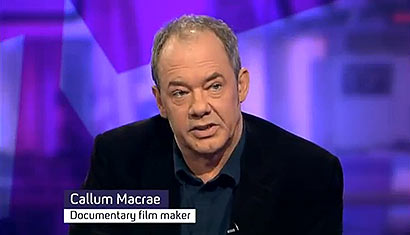No Indian visa for Channel 4’s Callum Macrae

India has denied a visa to Callum Macrae, the director of a documentary that exposed alleged war crimes in Sri Lanka.
Macrae, whose team was nominated for the Nobel Peace Prize last year, made news again last Thursday when UK’s Channel 4 telecast footage acquired from him showing LTTE TV anchor-actor Isai Priya’s capture during the last phase of the Lankan war. Priya was found dead on May 18, 2009, with visible marks of torture. The video was telecast worldwide and caused an uproar that cast a shadow on the Colombo Commonwealth summit mid-November.
“I am due to fly out on November 6 for a screening of my documentary in Delhi the next day. I find it extraordinary that I still do not have my visa, despite the fact that I first applied more than eight months ago,” Macrae told TOI over the phone from London. “I know that the war crimes and crimes against humanity committed in the last few months of the civil war in Sri Lanka are a matter of considerable concern to the government in India. And I am at a loss to understand why they are giving the impression they want to prevent me coming over to talk about my film and the evidence that we have been gathering for more than three years.”
Minister of state for external affairs E Ahamed told TOI he didn’t interfere in granting visas. “There are set protocols, and the visa officer has to take a call,” he said. Macrae said he applied for the visa in February to attend a pre-launch press conference on the documentary, around the same time he had released photographs of slain LTTE leader V Prabhakaran’s son Balachandran apparently in the custody of Sri Lankan forces, shortly before the 12-year-old was allegedly shot dead towards the end of the Lankan war.
“My passport was then returned with the remark ‘visa applied for.’” he said. “I approached the Indian high commission in London many times, the latest on Monday, but there has been no response from the officers. I sincerely hope this has been caused by a bureaucratic mix-up and is nothing that could be perceived as some kind of attempt to prevent discussion of this issue,” said Macrae, who had had an exchange of mails with the Indian high commission in London, and had sent two letters to the Union home ministry.
Macrae said Sri Lanka has been trying to systematically prevent screening of his documentary, ‘No Fire Zone: The Killing Fields of Sri Lanka’. “They protested over screenings in the UN and the European Union. In Malaysia, they are accused of putting pressure on the government to stop a screening organised by the Human Rights NGO Pusat Komas in Kuala Lumpur. Indeed when the screening went ahead it was raided by between 30 and 40 members of the Censorship Board and the police. They did not manage to stop the screening, but they arrested the organizers and one of them, a brave young woman called Lena Hendry, is now awaiting trial and could face a maximum of three years in jail,” the film-maker said.
“I sincerely hope that this pattern of pressure from the Sri Lankan government does not have anything to do with India’s decision not to give me a visa. If so it would be doubly ironic given that Sri Lanka itself – under pressure from the Commonwealth – has publicly agreed to give me a visa for CHOGM,” Macrae added, Times of India reports.
Latest Headlines in Sri Lanka
- Sri Lanka condemns Bondi Beach attack in Australia December 15, 2025
- Sri Lanka estimates USD 400 Million for railway reconstruction after Cyclone Ditwah December 15, 2025
- Large-scale drug trafficker arrested in Wattala with 21 kg of cannabis December 15, 2025
- Tragedy at Bondi Beach: Mass shooting at Jewish festival kills 15, injures dozens December 15, 2025
- India hands over medicines and dry food aid to Sri Lanka December 15, 2025



India has the brain not to allow a vermin into the country.
there is no justice and it is completely dead in most of the countries especially countries like sri lanka , india , pak – south asian countries.
what is the right that india has to reject this mans visa?
is he terrorist or else a drug dealer?
He revealed the truth, that is the only thing he did.
thanks god not to allow him inside ind and sl, other wise he would face blue van in ind and white van in sl.
welldone India,today Srilanka,Tomorrow will be India…please open your eyes.